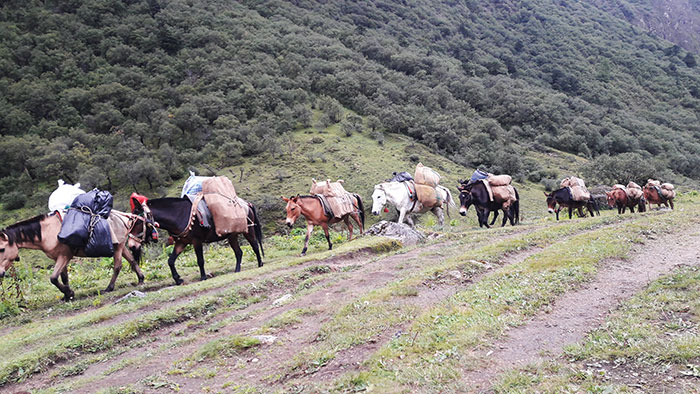
Highlanders in Lingzhi, in the absence of a motorable road, depend on yaks and horses for their livelihood

Horses descend from Lingzhi to collect goods from Thimphu
Thinley Namgay
Thimphu dzongkhag tshogdu approved higher rates for porter pony services for the highland communities of Lingzhi, Soe, and Naro on April 6.
The old porter rate was Nu 300 a day and the daily pony was Nu 450.
The DT raised daily porter charges to Nu 600, and Nu 900 for pony services.
Soe Gup Kencho Dorji said: “Considering the price of fodder for horses and other necessities, the expenses are more than the income earned from such services.”
Local leaders said that the raise would have a huge positive impact on the residents in the highlands. People in these communities depend on yaks and horses for their livelihood. Dzongkhag Tshogdu members said that the matter was deliberated in the past sessions, but nothing was decided.
“The government revised salary and the allowances for civil and public servants, but the porter pony rates remained unchanged for us,” said Kencho Dorji.
Dzongkhag Tshogdu’s Thrizin, Gado, said that he discussed the porter pony charges with the finance minister Namgay Tshering in Paro. “Lyonpo said that the time has reached to increase the porter pony charges. He said that dzongkhag could decide the new rate. For instance, in Laya, people are paid Nu 800 for a horse in a day.”
Meanwhile, the issue of firewood rates in Lingzhi also surfaced in the dzongkhag tshogdu.
Despite having electricity, parents of children studying in Lingzhi Primary School have to contribute 10 horse loads of firewood annually to the school for each student.
Lingzhi Gup Wangdi said that the school paid Lingzhi residents Nu 200 for a horse load of firewood.
“Due to lack of manpower and fewer horses in the communities, horse owners charge as high as Nu 400 per horse,” said Wangdi. “The payment from the school is too less.”
He proposed to revise the rate.
The dzongkhag tshogdu decided to increase the rate to Nu 300. “The new rate would help people although it’s a small change,” said Wangdi.
Residents have been collecting firewood near Jigme Dorji National Park. “Foresters are now asking people not to gather firewood close to the park area,” he said.
He said that the school could use electricity for cooking meals instead of cooking only rice. The extended classrooms at Soe and Barshong use electricity for cooking.
Lingzhi has five teachers, including the principal, and 54 students from class PP- VI.


